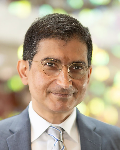 Darius Lakdawalla, PhD is the Quintiles Professor of Pharmaceutical Development and Regulatory Innovation at the University of Southern California Mann School of Pharmacy and Pharmaceutical Sciences and Price School of Public Policy. He also serves as Chief Scientific Officer at the USC Schaeffer Center for Health Policy & Economics, one of the premier health economics research institutions in the United States.
Darius Lakdawalla, PhD is the Quintiles Professor of Pharmaceutical Development and Regulatory Innovation at the University of Southern California Mann School of Pharmacy and Pharmaceutical Sciences and Price School of Public Policy. He also serves as Chief Scientific Officer at the USC Schaeffer Center for Health Policy & Economics, one of the premier health economics research institutions in the United States.
Dr Lakdawalla has transformed the study of value, using economic insight to reorient value assessment around what matters to patients and their families. His work illuminates how to promote value-based decisions by providers and innovators, as well as elucidating how policy affects health-related behaviors. He has published more than 140 peer-reviewed journal articles in medical, economic, and health policy journals, including The New England Journal of Medicine, Health Affairs, Value in Health, The American Economic Review, The Quarterly Journal of Economics, The European Journal of Health Economics, and The Journal of Health Economics, where he served as Associate Editor. According to bibliographic data (IDEAS), he is one of the top 50 most cited health economists in the world.
Dr Lakdawalla has pioneered new concepts like the “value of hope,” “insurance value,” and other measures of value. He co-developed Generalized Risk-Adjusted Cost-Effectiveness (GRACE), a value assessment approach that centers around the preferences of patients—and for which he received ISPOR’s HEOR Excellence Award for Methodology. As a member of ISPOR’s Value Assessment Framework Task Force, he led the “ISPOR value flower” manuscript, enumerating the frontiers in value assessment. In 2009, he also led the first published study on the long-term societal costs and benefits of US government drug-price negotiation.
Consistent with ISPOR’s strategic vision, Dr Lakdawalla has decades of experience translating cutting-edge research into solutions for industry and policy leaders. He has testified before the US House of Representatives and Senate, highlighting the importance of pharmacoeconomics and outcomes research. He serves on the California Institute of Regenerative Medicine (CIRM) Access and Affordability Working Group, which aims to ensure that cell and gene therapy R&D ultimately benefits patients and their families. He cofounded Precision Health Economics, a health economics consultancy, and EntityRisk, which provides cutting-edge predictive analytics to life sciences companies. He served as the Founding Director at the Innovation and Value Initiative (IVI), now the Center for Innovation and Value Research. And he has trained generations of undergraduate and graduate students at USC’s Schools of Pharmacy and of Public Policy who have gone on to successful careers in academics and industry.
Dr Lakdawalla received a BA in mathematics and philosophy from Amherst College and a PhD in Economics from the University of Chicago.
ISPOR Vision Statement by Darius Lakdawalla, PhD
Throughout my career, I have sought to contribute to science not for its own sake but to improve life for current and future generations. The twin goals of scientific achievement and social impact mirror ISPOR's own strategic goals for the future.
In a remarkably short time, ISPOR has established itself as the premier scientific organization for health economics and outcomes research (HEOR) professionals. Its Strategic Plan 2030 sets an even higher bar, recognizing that science aims to improve lives, not simply to build knowledge for its own sake. ISPOR's leaders imagine an organization that safeguards the rigor and credibility of its scientific heritage, but also builds bridges that enable policymakers, clinicians, patients, and industry leaders to harvest the fruits of our scientific labor. Yet, ISPOR faces a public and a health policy community that are increasingly skeptical of data and science.
I envision an ISPOR focused on bridging the growing divide between skepticism and science. First, ISPOR’s diversity and power to convene presents an opportunity for honest dialogue with all stakeholders. This will require not just openness to discussion, but proactive engagement with policymakers, patient groups, and other stakeholders. Our first priority is to listen and then to build confidence by evolving the science to reflect what we learn from others. I believe we can continue to improve methods in our field to better incorporate patient and policy perspectives, reinforcing public confidence in our methods. My own academic research has focused on aligning the preferences and values of patients and their families with rigorous and data-driven economic science. And my time as the Founding Director of the Innovation and Value Initiative focused on centering the nascent organization around the principles of honest transparency and broad stakeholder engagement.
Second, our obligation is to support and represent the science of HEOR in the public policy conversation. This requires promulgating evidence-based research, translating and disseminating it into media that reach policymakers, and addressing misinformation through rapid-response whenever it is encountered. In my Congressional testimony and my informal engagement with policymakers, I seek to translate complex ideas into nuanced and fit-for-purpose policy recommendations, without oversimplifying or brushing aside important details. In my students, I strive to engender curiosity about how patients and firms see the world and make decisions, encouraging an approach to science based on engagement with data and the real-world.
My experience tackling significant scientific problems and translating their solutions for policy and public audiences provides an asset to me in helping ISPOR realize its vision for socially impactful science. Our HEOR field finds itself at a pivotal moment, when its ideas have suddenly gained currency in US and global health policy debates. Yet, our influence in these debates remains far from guaranteed. It depends on our ability to engage in a complex and fraught public discussion around healthcare. I believe ISPOR’s diverse and accomplished membership contains the wisdom and the courage we need to succeed.
